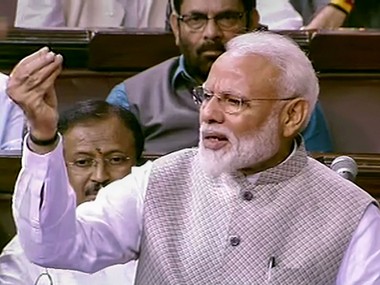Sardar Vallabhbhai Patel was a member of Jawaharlal Nehru’s cabinet, the first cabinet of Independent India. In the official photograph of that cabinet clicked on 31 January, 1950, Nehru is seen sitting in the centre, Patel and Rajendra Prasad are seated to the right, Shyama Prasad Mukherjee to the extreme right and on the left, the picture had Dr BR Ambedkar. Whether the seating layout was choreographed to the tune of ideological beliefs is pure conjecture but history is proof that differences with the man in the centre of the frame have shaped the evolution of political and social thought in India. The Narendra Modi-led NDA government has been unabashed in its celebration of Patel as the country’s unifier. In a veiled attack on the Congress ahead of Gujarat polls in 2017, Modi had stated that some parties and governments in the past have tried to run down and erase the contributions of Patel in unifying the country immediately after Independence. On the 142nd birth anniversary of Patel, Modi had said that due to the statesmanship and political acumen of the country’s first home minister, India stands united as one nation against the wishes of the colonial rulers, who wanted the country disintegrated into smaller states after Independence. [caption id=“attachment_6887221” align=“alignleft” width=“380”] Prime Minister Narendra Modi speaks in the Rajya Sabha. PTI[/caption] “There have been attempts to run down Patel, to ensure that the contribution of Patel is forgotten. But Sardar is Sardar, whether any government or any party recognises his contribution or not but the nation and the youth will not forget him," he had said without naming any government or party. “The youth of India respects him and his contribution towards the building of our nation," the prime minister had stated. On Wednesday, speaking in the Upper House of Parliament, the prime minister lashed out at Congress over its attitude towards Patel. “I still believe had Sardar Patel been made the first Prime Minister of India, the Kashmir issue would have been resolved. Sardar Patel lived and died as a Congressman. When we are paying tributes to the great leader, Congress has a problem,” Modi said. History has been kinder to India’s loh purush than historians, who couldn’t see beyond Nehru’s undeniable contributions towards building modern India. Back in 1936, Patel had reservations regarding the choice of Nehru as president of the Indian National Congress, especially because the leader had returned from Europe with foreign models of socialism which couldn’t be replicated in a country that had complex diversities of its own. Seven members, including Patel, Prasad and JB Kripalani, had resigned from the Congress Working Committee (CWC) but were persuaded by Mahatma Gandhi to stay back. In 1946, shortly before India met its independence, 12 out of 15 provincial Congress committees had recommended Patel’s name for the post of president of the party. Acharya Kripalani, the third candidate in the race along with Patel and Nehru, had written: “All PCCs sent in the name of Patel by a majority but none that of Jawaharlal Nehru…and I made a proposal saying some Delhi fellows wanted Jawaharlal’s name. I am to blame.” In his reply to senior Congressman DP Mishra, Patel had acknowledged Nehru’s ‘immaturity’ in giving preference to young leaders over veterans with greater knowledge of public administration. In the words of historian biographer Rajmohan Gandhi, “The Mahatma may have felt that Jawaharlal was more likely than Patel to resent a number two position.” Yet, the Sardar’s feelings towards the Mahatma aren’t known to be embittered by the many dents made on his political vision and aspiration. Patel had conceded to the partition to stop the bloodshed engineered by the Muslim League and to avoid division of the country. In Patel’s own words, “The partition has become inevitable due to Muslim League’s attitude to interim government and pro-Muslim League behaviour of Muslim government officers.” The Congress leadership has often sided with Maulana Abul Kalam Azad’s rather uncharitable view of Patel as the man behind the partition and that Patel had agreed to the partition before Nehru. In 2o13, UPA’s finance minister P Chidambaram quoted from Azad’s book India Wins Freedom: “As soon as Sardar Patel had been convinced, Lord Mountbatten turned his attention to Jawaharlal. Jawaharlal was not at first at all willing and reacted violently against the very idea of Partition, but Lord Mountbatten persisted till, step by step, Jawaharlal’s opposition was worn down.” In an older interview with Firstpost, Congress Member of Parliament and historian Shashi Tharoor had said that the entire process of historical appropriation has been a fairly deliberate tactic on part of the BJP in its most recent incarnation and that there’s no legitimate argument to be made for appropriating Sardar Patel’s record with that of the BJP. Scholarship that highlights the sidelining of Patel’s efforts to push Nehru forward has remained scarce. But the government in power, which installed a 182 m Patel statue in Gujarat’s Narmada district in 2018, is determined to keep reminding the grand old party of the leaders it ignored to bring its dynasty to the fore.
Sardar Vallabhbhai Patel was a member of Jawaharlal Nehru’s cabinet, the first cabinet of Independent India.
Advertisement
End of Article


)
)
)
)
)
)
)
)
)



